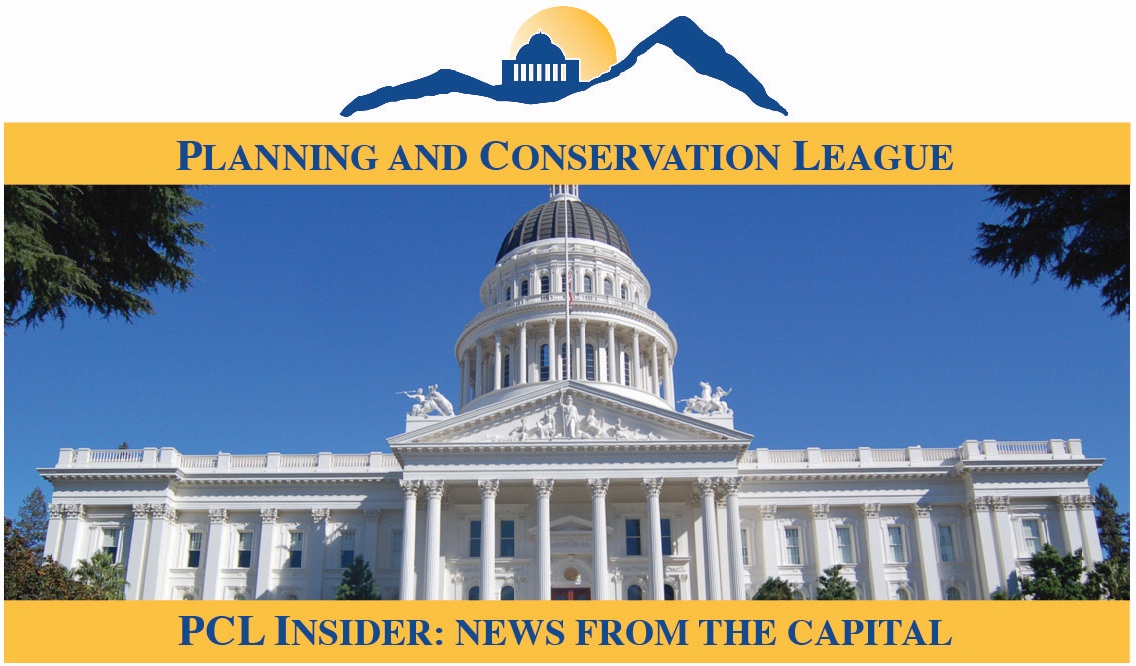The 2023 legislative session was jam-packed for the Planning & Conservation League. We directly sponsored or co-sponsored six bills and were crucially involved in furthering many other essential pieces of legislation covering water, housing, CEQA, wildlife, energy, and infrastructure. Of our six bills – all taking bold steps to tackle difficult issues –the Governor has already signed one, and four are still alive to continue on to next year. Here are some highlights of this exciting year.
Water Progress:
Much of PCL’s efforts and focus are directed toward our continued push for meaningful, common-sense water law reforms, which give the State the improved tools necessary to manage our water supply and generate benefits for all users.
In a significant step toward this goal, SB 389 (Allen), sponsored by PCL, was signed into law by the Governor earlier this month. SB 389 gives the State Water Resources Control Board (SWRCB) the explicit authority to investigate the validity and scope of pre-1914 and riparian rights. Now, these two groups – who hold 45% of rights and 35% of California’s water by volume – are finally subject to the SWRCB oversight we rely on to prevent unchecked water theft.
This small but substantial improvement was a very heavy lift, requiring careful and tactful negotiation with a large coalition of right-holders who initially opposed this reform. We hope that this successful negotiation will help pave a path for stakeholder collaboration on our two related bills, AB 460 (co-sponsored with California Trout and Trout Unlimited) and AB 1337 (co-sponsored with California Coast Keeper). You can learn more about these bills and the growing coalition of interests working in support of these reform efforts here. These bills will continue to be a priority as we look to the coming year.
PCL backed other important water-related legislation this session, including budget allocations for water data modernization and expanded instream monitoring programs. Alongside this, PCL advocated for the inclusion of “groundwater recharge” into the definition of “natural infrastructure” in state code, which will expand funding opportunities for crucial recharge projects and improve California’s climate resiliency.
We also supported AB 809, which creates a program to monitor salmonids, and SB 3, which extends existing protections against residential discontinuation of service for small community systems that were previously left vulnerable under the existing law.
Finally, we supported Senator Eggman’s proposal to mandate the completion of the Bay-Delta Plan (SB 687), which would codify an ongoing priority and recommendation of PCL.
Preparing for Wildfire:
PCL sponsored SB 571, which would mandate that new development projects in high-risk fire areas produce an evacuation plan that meets specified performance standards. The bill does not prescribe where and where not to build; it only mandates that safe evacuation is planned for ahead of time, and PCL is committed to moving this bill forward in 2024.
Responsible Methane Governance:
PCL also sponsored SB 781, seeking to minimize methane leakage in production and delivery processes through regulatory development. The bill stalled in the second house but spurred a worthwhile debate about the best policy mechanism for accomplishing this goal. This necessary conversation will continue into next year.
VMT Reduction:
The final bill sponsored by PCL in 2023 was SB 670, which would have initiated the development of a statewide Vehicle Miles Traveled (VMT) performance-mapping database. The implementation of California’s climate laws and housing incentives are impeded by the utter lack of sufficient VMT mapping across much of the state. Though this bill was held in Appropriations, widespread interest remains in tackling this roadblock to effective policy.
PCL was also part of a broad alliance supporting AB 6 and AB 7 (this session’s iteration of Friedman’s AB 2237 and AB 2438 from the previous session). These bills aim to improve the enforcement of our climate laws in land use and transportation planning by compelling greater local and state compliance. Despite the need for action, both the administration and our transportation agencies have resisted any further statute, so far, and their reluctance in this matter is extremely disappointing.
CEQA:
As always, PCL remained front and center in debates over CEQA. We, alongside many others, opposed AB 1633. This bill, among other things, makes project disapprovals or demands for further environmental review a potential violation under the Housing Accountability Act. The implications of this provision are broad, and we believe the overall bill is, simply put, bad policy. 1633 has now been signed into law, but the conversation between proponents and opponents is not over.
Another two-year bill of concern is SB 393, which would require the disclosure of contributors to CEQA litigation, and, as written, could reduce or eliminate project-level environmental review.
On a positive note, we celebrate the passage of SB 69, which strengthens noticing requirements under CEQA, clarifying a recent and problematic court decision that would have relaxed obligations and reduced community involvement in this vital process.
Possibly the most significant and complex environmental conversation this session revolved around the sweeping infrastructure package the Governor pushed through via budget trailer bill. You can read more about those efforts in our June Insider, but, in short, the environmental and environmental justice community stood together against this effort to reduce environmental review and community access to the development process. This collaboration significantly improved the end product, but the question still remains: How do we safely and equitably accelerate the next generation of needed infrastructure? PCL does not believe that gutting front-end environmental review and good community planning is the right way to…but we and our partners are indeed pondering what viable alternatives could be.

